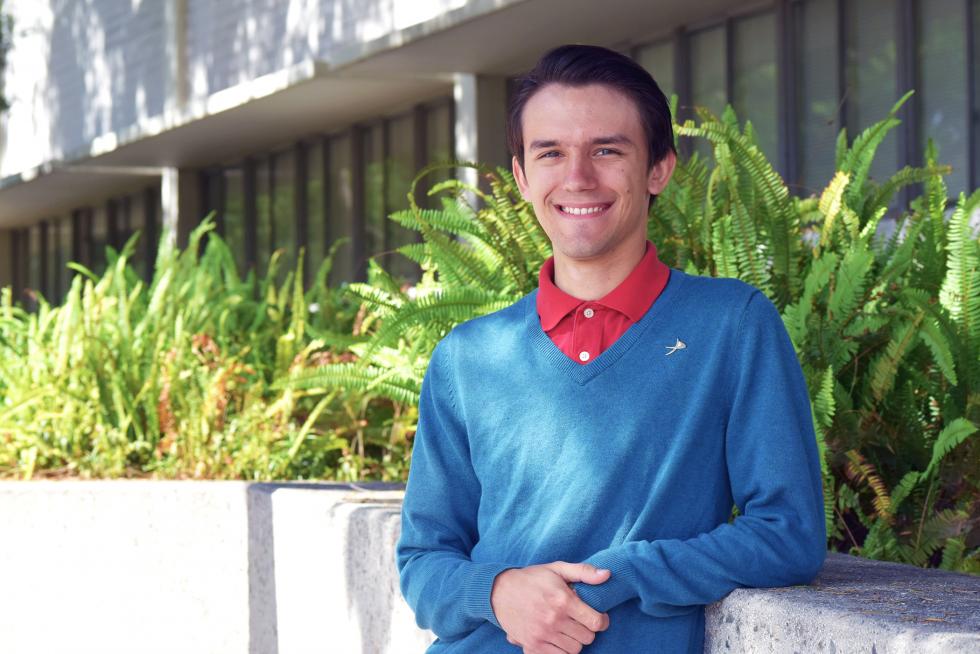Name: Sean Nesler Major: Television, Film, and Media Studies
Minor: Science, Technology, and Medicine Studies Graduation Date: May 2018
August 2017
Name of award and a brief description:
The Ebell of Los Angeles is a social and philanthropic organization. The Ebell Club was founded by women in the late nineteenth century. Though it began small, The Ebell Scholarship Program now provides scholarships, totaling hundreds of thousands of dollars, to students annually.
What are your future educational and career goals?
I am currently pursuing a career in filmmaking. While I am pursuing both fiction and non-fiction filmmaking, I am particularly interested in educational media and science communication. My goal is to write and direct my own films. I plan to apply for internships with various production companies and studios before and after I graduate. I may choose to pursue a master’s degree in the future, but for now I am focusing my efforts on completing my BA and establishing a solid portfolio and digital online presence.
What inspired you to apply for this award?
While researching scholarships, the Ebell caught my attention because of the organization’s rich history and philanthropic endeavors. Their organization, according to their website, awards hundreds of thousands of dollars in scholarships annually. Additionally, the organization’s motto appealed to me on a personal level.
The Ebell’s motto, “I will find a way, or make one – I serve,” is a variation of a quote often attributed to Hannibal, who is supposed to have said, “I will either find a way or make one,” when told that using elephants to cross the Alps was impossible. Various iterations of this phrase have been used as mottos, but the Ebell made one important addition – “I serve.”
I often find myself having to “find a way, or make one,” and I believe that there always is a way. “The best laid plans of mice and men,” as the poet, Robert Burns, wrote, “often go askew,” and student life has an unfortunate tendency of swerving in odd directions. But radical changes and unexpected emergencies can (and, I believe, should) be met with tenacity and determination.
As a college student often struggling to “find a way, or make one,” the Ebell scholarship program seemed, to me, like an obvious scholarship to which I should apply.
What was the most challenging part of the application process?
The personal statement, as many scholarship applicants may agree, is the most difficult aspect of any application. It serves as an ultimate first impression. It is, in one sense, an opportunity to boast. But it is also, more importantly, an opportunity to create a solid and honest impression. When you are finally interviewed, you are putting a face to that personal statement. But that statement got you in the door. The task is daunting, but the rewards of a well-written statement can make the effort worth it.
What tips or suggestions do you have for future applicants?
Be honest in your personal statement and your interview (of course), but don’t sell yourself short. Apart from meeting specific requirements, you don’t have to be an aspiring astronaut/president/artist with perfect academics and amazing hobbies to be considered for a scholarship. But you do have to be yourself. Think about yourself objectively. What stands out and demands attention from that point of view?
Get your letters of recommendation as soon as possible, but don’t forget to give your sources time to write them. Professors and employers all have lives outside of work, so give them the time they need to write your letters of recommendation. Make a list and send requests as soon as possible. Be polite and courteous, but let them know the deadline.
Send everything with plenty of time to spare. Of course, it’s okay to be a little bit of a perfectionist. Review your application packet, check for spelling and grammatical errors, make it presentable. But at some point you have to send it off. It is better to crank out an ugly rough draft early, and make it pretty after multiple revisions, than it is to wait until the last minute before putting pen to paper (or fingers to keys). Write an outline, show your drafts to friends and advisors, ask for help—do what it takes, but do it early.
What would people be surprised to know about you?
I have never left California (and I am embarrassed to admit it). One of the many aspects of filmmaking that appeals to me is the opportunity to travel and explore the world I live in. Fortunately, both fiction and non-fiction filmmaking provide such opportunities.
----
For more information about the Ebell Scholarship, please contact NISFeP.
